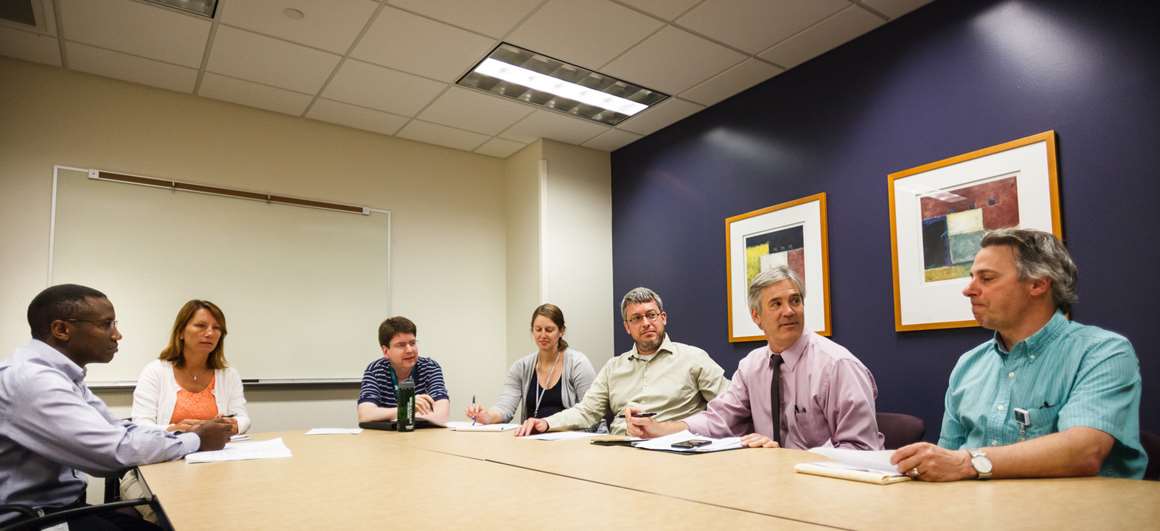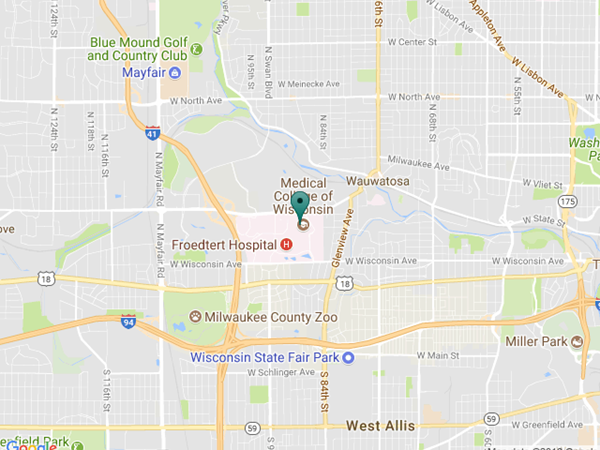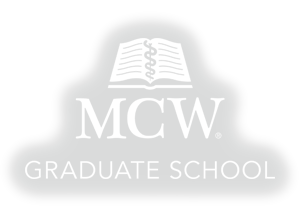Medical College of Wisconsin Graduate School Faculty Resources & Tools
As a valued member of MCW’s graduate faculty, we are committed to providing you with a variety of resources and guidelines to support your teaching, research, advising and mentoring activities.
The Graduate Student Handbook (PDF), in conjunction with program specific guidelines as defined by each department, is the official record of program requirements, as well as all policies and procedures of the MCW Graduate School. We encourage all faculty members to become familiar with the contents of these publications.
Additionally, we have several resources to assist you with collaborating with other faculty members, serving as a mentor to your students and leveraging social media to build your network.

MCW’s Graduate Studies Council (GSC)
The members of the GSC consist of MCW’s Program Directors and Recruitment Directors from each of the Graduate School programs, the President and Vice President of the Graduate Student Association, the Dean of the Graduate School and other members appointed by the Dean. Membership terms are determined by the length of time the member(s) remain in the position they currently hold (i.e. as program or recruitment director, as President and Vice President of the GSA, etc.)
Term: Terms are determined by the length of time the member(s) remain in the position they currently hold i.e.: as program or recruitment director, as President and Vice President of the GSA, etc.
The Standing Committees of the Graduate School are defined in the Graduate Student Handbook (PDF).
2024-2025 Outstanding Educator Awards
Biochemistry
Stephanie Olivier-Van Stichelen, PhD
Elizabeth Sweeny, PhD
Emma Morrison, PhD
Biomedical Engineering
Adam Greenberg, PhD
Brian Schmidt, PhD
Frank Pintar, PhD
Guilherme Garcia, PhD
Robert Cooper, PhD
Robert Scheidt, PhD
Roger Guillory, PhD
Scott Beardsley, PhD
Biophysics
Candice Klug, PhD
Jason Sidabras, PhD
Michael Lerch, PhD
Neil Hogg, PhD
Cancer Center
Deb Nevels, MSHCM
Cell Biology, Neurobiology and Anatomy
Ross Collery, PhD
E Lezi, PhD
Ken Taniguchi, PhD
Sun Daochun, PhD
Teresa Patitucci, PhD
Xuelin Lou, PhD
John Pulikkan, PhD
Allison Ebert, PhD
Michaela Patterson, PhD
Sid (Sridhar) Rao, MD, PhD
Center for Bioethics and Medical Humanities
Arthur Derse, MD/JD
Comprehensive Injury Center
Felice F. Borisy-Rudin, PhD
Data Science Institute
Lin Chien-Wein, PhD
Anjishnu Banerjee, PhD
Michael T. Zimmerman, PhD
Paul Auer, PhD
Epidemiology & Social Sciences
Julia Dickson-Gomez, PhD
Craig Fleischer, PhD
Matthew Dellinger, PhD
Ronald Anguzu, PhD
Wei Xu, PhD
Family and Community Medicine
David Nelson, PhD
Staci Young, PhD
Genetic Counseling
Angela Pickart, MS, CGC
Amanda Jacquart, MS, CGC
Allison Genchanok, MS, CGC
Samantha Sandlow, MS, CGC
Samantha Stachowiak, MS, CGC
Global Health
Tifany Frazer, MPH
Institute for Health & Humanity
Abby Collier, DrPh, MS
Julie Willems Van Dijk, PhD, MSN
Kaija Zusevics, PhD, MPH
Lance Gable, JD, MPH
Marta McMillion, DrPH, MPH
Tarakee Jackson, DrPH, MPH
Medicine
Aprill Dawson, PhD, MPH
Dawn Wolfgram, MD
Jacquelyn Kulinski, MD
Joni Williams, MD, MPH
Kathyrn Flynn, PhD
Microbiology & Immunology
Amy Hudson, PhD
Christopher Kristich, PhD
Dara Frank, PhD
Joe Barbieri, PhD
Ken (Kenneth) Brockman, PhD
Michael Dwinell, PhD
Nita Salzman, MD, PhD
Rob Lochhead, PhD
Scott Terhune, PhD
Bonnie Dittel, PhD
Neurosurgery
Matthew Budde, PhD
Ophthalmology and Visual Sciences
Dan Lipinski, PhD
Joel Miesfeld, PhD
Miranda Scalabrino, PhD
Ross Collery, PhD
Pediatrics
Andrew Spearman, MD
John LaDisa, PhD
Michelle Willes, MS, CGC
Pharmacology and Toxicology
Qing-Song Liu, PhD
Sandra Pfister, PhD
Cece Hillard, PhD
Chris Olsen, PhD
Constanza Garcia-Keller, PhD
John Mantsch, PhD
Kristin Ciezki, PhD
Qingsong Liu, PhD
Sandra Pfister, PhD
Wai-Meng Kwok, PhD
Felice F. Borisy-Rudin, PhD
Physiology
Anne Kwitek, PhD
Aron Geurts, PhD
Caitlin O'Meara, PhD
Chelsea Weaver, PhD
Denise Cook-Snyder, PhD
Matthew Hodges, PhD
Psychiatry and Behavioral Medicine
Felice F. Borisy-Rudin, PhD
Radiology
Troy Crawford, PhD
School of Pharmacy
Mahfoud Assem, PharmD, PhD
Surgery
Angela Mathison, PhD
Mochamad M. Nataliansyah, MD, PhD
Faculty Tools
Curriculum & Programs
Changes to existing courses or program requirements, or adding new courses or programs, need to go through an approval process. To ensure the Graduate School meets the Registrar’s deadline of February 1, 2026, new/substantial changes to courses for the 2026-2027 Academic Year (Fall 2026-Summer 2027), please adhere to the following Graduate School deadlines:
Preferred Deadline: November 1, 2025
Final Deadline: December 1, 2025 (anything received after this deadline will be reviewed/approved for the 2027-2028 Academic Year (Fall 2027-Summer 2028)
- Those seeking to add a new program should begin the process with the Health Science University (HSU) committee and Assessment Oversight Committee (AOC) at least 6-9 months prior to the Graduate School deadlines listed above.
- New certificate programs should begin the process with the Graduate School at least 3-6 months prior to the Graduate School deadlines listed above.
These Graduate School deadlines ensure that your proposals are reviewed and approved by the GSC Curriculum and Programs Committee and Graduate Studies Council prior to February 1, 2026.
Please reference these guides, forms, and templates:
- New Course Proposal Form (PDF)
- Substantial Change to Course Form (PDF)
- Course Credit Calculation Policy (PDF)
- Course Syllabus Requirements (PDF)
- New Graduate Program Guide (PDF)
- New Certificate Guide (PDF)
- Syllabus Template (PDF)
Questions Contact:
School of Graduate Studies
Curriculum & Programs
gscurriculum@mcw.edu
Faculty Resources
Graduate Studies Council (GSC)
The Graduate Studies Council (GSC) is the highest approval committee of the Graduate School and is the body responsible for the oversight of all graduate programs and activities. Its responsibilities include approval of admission standards, oversight of academic standing and professionalism, approval of curricular and programmatic changes, evaluation of all aspects of graduate education, including course, programs and faculty, and the nomination of election to Graduate School positions.
Faculty Resources
Course Director Overview (PDF)
Office of Faculty Affairs and Leadership Development
Resources for Faculty Supporting Students:
Follow Us On Our Socials
Stay up-to-date on events, news, and other happenings in the MCW Graduate School!



